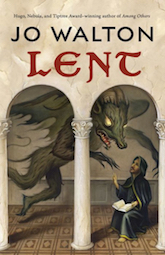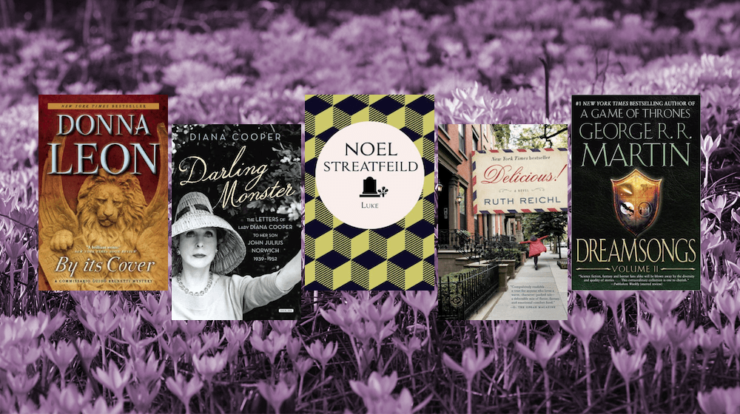It’s true that I read a lot, but the amount I read at any given time varies depending on what else I’m doing. This month I was in Chicago for three weeks helping Ada Palmer run the papal election of 1492 as part of a Renaissance History immersion course. This is a ton of fun but very time intensive. I also went to Minicon. So I only read twelve books. And here they are.
Darling Monster: The Letters of Lady Diana Cooper to Son John Julius Norwich, 1939-1952 2013.
I like reading letters, and I’m usually reading some. This was a very long, very interesting collection. Lady Diana Cooper was the daughter of — well, actually she was the daughter of a Duchess and the Duchess’s boyfriend, but she was considered to be the daughter of a Duke and had the courtesy title. She was a famous beauty before WWI and then married to Duff Cooper, who was in the British government in the thirties and during WWII. (“The war” I started to write, as if there could be only one “the war”) and later ambassador in Paris. John Julius Norwich is of course a well known historian. Lady Diana is always amusing, sometimes catty, sometimes name dropping, and very very much the product of the upper class early twentieth century society where she grew up. So it’s interesting seeing her letters reflecting the world changing, as well as politics and gossip of the day. Each section of the book has an introduction for context of both the world and their lives, and I thoroughly enjoyed reading it.
Allegro Court Brenda Margriet, 2019.
The author comments on Jennifwer Crusie’s blog, and had a special post for her new book, so I bought it. It’s a romance novel about a woman who works in construction and the cello prodigy she loves. Will they end up together despite the obstacles… well, yes, you know they will, but seeing the story of the accessiblity renovation of the cello guy mother’s house, the family interactions, the age range of people, and the fact that it’s set in Northern British Columbia, made this thoroughly enjoyable. I like the variations on a theme you get in genre romance, and the way it shows details of everyday life. I especially liked the grandfather’s romantic subplot.
A Ride to Florence Through France and Switzerland, described in a series of letters by a Lady Augusta Macgregor Holmes, 1839. Volume 1 of 2.
Come on, who could resist this? I found it on Project Gutenburg. They ride through France in this volume, commenting on the scenery and the inns and the locals. It sometimes gets a little long winded about the history of the places they pass through, but 1839 is such a fascinating moment to be doing it. I own volume 2 and will read it soon.
Florence in the Age of the Medici and Savonarola 1464-1498: A Short History With Documents Kenneth Bartlett, 2019. Research.
Post-book too late research. I could really really have done with this book when I was writing Lent, as it is, it was a bit annoying to read. The first half is a very basic intro to the period, the second half is a pile of original sources in translation, some of which I had to read in Latin when I wanted them, and one or two of which were previously unseen. A very useful collection for anyone writing a novel about Savonarola, I say through gritted teeth. Actually the extracts of Savonarola are way too short for that, but the supplementary material is great. I wish I’d known they made a fleur-de-lys out of flowers when Charles VIII rode in to Florence — what flowers, I wonder, as it was November!
Dreamsongs Vol II George R.R. Martin 2003. Half-re-read.
A collection of short stories of Martin’s, all of which I’d read before, mostly multiple times, and some screenplays which were new and interesting. Martin’s short work has amazing, as good as anything being written. It was his short work that I read first. Among the good, interesting, well worth reading stories, there two absolutely stunning pieces here, Unsound Variations and Portraits of His Children. The first is about alternate histories of your own life, and I always cite it when people ask me about other things like My Real Children. The second is about… well it’s about creativity and forgiveness, but it’s kind of a horror story that needs trigger warnings about forgiveness, and I decided not to re-read it late at night. Great story though. Great collection altogether.
Nuttie’s Father Charlotte M. Yonge, 1885. Gutenburg.
Oh I loved this book. Charlotte M. Yonge is a Victorian writer who has a deeply Christian worldview and all her best books (she also wrote historical novels) are about Victorian families and the stress of life and redemption. This one is about a girl whose parents were married and then separated and now they reunite, changing everything about her life, and she has to adjust. Terrible things happen. Children die. There’s drug addiction. Also there’s earthly vanity and a kingdom of heaven, and they’re a real part of the worldbuilding here. So it’s set in a weird universe best thought of as fantasy, but it’s also about well drawn characters doing their best in slightly melodramatic circumstances. Yonge was a bestseller, incredibly popular in her day, almost forgotten now. I find her unputdownable once I start reading her, though I am trying to ration those few books of hers I have not yet read. This one is not her best known, but it would be a perfectly good place to start.
Buy the Book


Lent
The Kindly Ones Melissa Scott, 1987. Re-read for book club.
This is a book where the central character, the one who is changed by the plot, is the world, the social world of Orestes, which was isolated from the human mainstream for centuries but is now back in contact with it and finding the old ways don’t fit. It’s also a story about unleashing repressed forces — in people and societies, and for that matter geology. It was a terrific book club book, everyone liked it but it provoked plenty of discussion — we were still thinking of more to say about it on the way home. It’s so interesting to see a genuine attempt at a post-gender society written so early.
Other Paths to Glory Anthony Price, 1971. Re-read.
This was my bath book. (I know my Kindle is supposed to be waterproof, but I don’t want to test it.) This is, I suppose, technically classified as a thriller. A young man part way through his PhD on WWI gets drawn into present day Cold War events that somehow involve his knowledge of the Great War. Tense, edge of seat stuff at all levels, the introduction of a major series character, and how history is never over. One of the best of the series, and a perfectly good place to start. If you want my explanation for why to read the series, it’s here.
Delicious! Ruth Reichl 2014.
A novel about a food writer, a magazine, and a mystery, by a food writer. The food writing is unsurprisingly very good, the mystery is… well… if you read it fast and don’t think about it, it works better. There are letters to the magazing from a girl during WWII, and the letters are great and the story is great, but the explanation for the way they have been hidden makes no sense when you think about it.
Luke Noel Streatfeild 1939.
Very weird. Another of Streatfeild’s adult books recently reissued as e-books. This one is about the death of a man by what must be suicide, but yet… the solution is very very obvious very very early, but it’s still worth reading for the character work. She is, as always, good at children, though she never did a psychopath kid in her children’s books.
The Courtier and the Heretic Matthew Stewart 2005.
A good but not great book about Leibnitz and Spinoza and how Spinoza influenced Leibnitz in unexpected ways. It’s one of those popular non-fiction books that makes too much of its thesis and is best when it is away from it and giving straight information. I recommend Delany’s The Atheist in the Attic. Science fiction readers might also note the implausibility of the death of Spinoza. I suspect he was kidnapped by time travellers and will show up in 2649 delighted with everything. If you don’t know much about Spinoza or Leibnitz and you’ve read the Delany, and you want to know more, and about their context, then this will do.
By Its Cover Donna Leon 2014.
This month’s Brunetti mystery, and an especially appealing one, as it begins with a crime in a rare books library in Venice and then twists in unexpected directions. Again I will say that the theme of this series is integrity, who has it, what it means, and how it can be twisted with history and lives and current events. These books are amazing, and while it wouldn’t matter very much if you started here, you might as well read them in order.
And that’s it for April, more next month!
Background photo: L. B. Tettenborn (CC BY-SA 3.0)
Jo Walton is a science fiction and fantasy writer. She’s published two collections of Tor.com pieces, three poetry collections, a short story collection and thirteen novels, including the Hugo and Nebula winning Among Others. Her fourteenth novel, Lent, is coming out from Tor on May 28th 2019. She reads a lot, and blogs about it here irregularly. She comes from Wales but lives in Montreal. She plans to live to be 99 and write a book every year.










